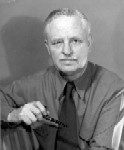 |
The Western History Collections Photographic Archives |
 | |
| Walter Stanley Campbell Photograph Collection |
Walter Campbell was born in Severy, Kansas, on August 15, 1887, to Walter and Isabella Vestal. (He was later adopted by his mother's second husband, acquiring the name
Campbell.) He attended Guthrie High School, but left in 1903 before graduation. Mr. Campbell then attended Southwestern State
Normal School from 1903 to 1908, when he graduated. He was awarded a Rhodes Scholarship, in which he was the first
Rhodes scholar from the new state of Oklahoma. As a result of the scholarship, he attended Merton College at Oxford
University from 1908 to 1911. He received a Bachelor's degree in 1911, and his master's degree (in absentia) in 1915.
Both degrees were for English Language and Literature. |
View selected photographs from the
Walter Stanley Campbell Photograph Collection
To view the complete Walter Stanley Campbell Collection, visit the Western History Collections
at the University of Oklahoma, Room 452, Monnet Hall, 630 Parrington Oval, Norman, Oklahoma, 73019.
(405)325-3641
Ordering Information | Price List
Photograph Policies | Photograph Disclaimer
Gallery
Western History Collections Photographic Archives